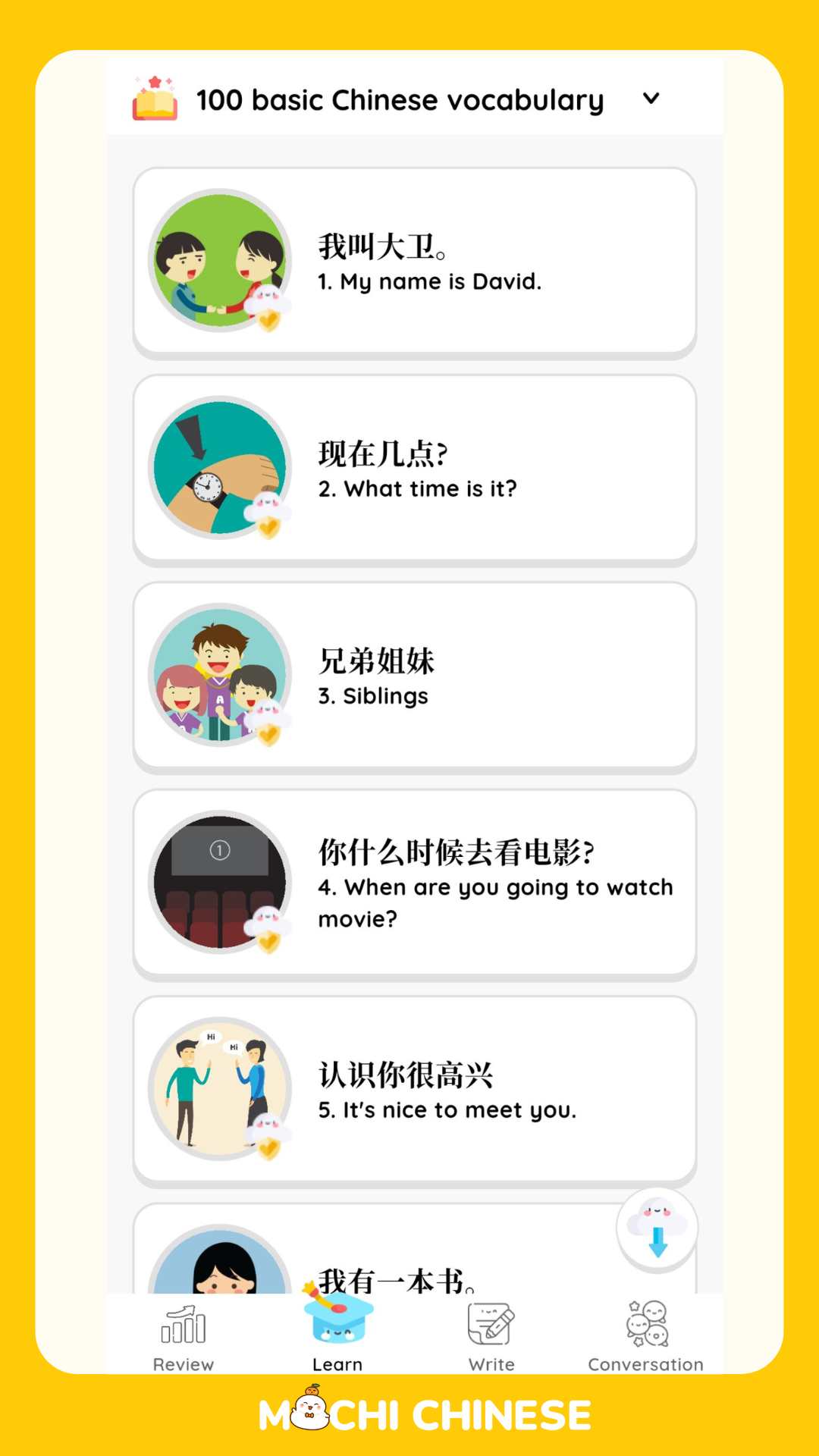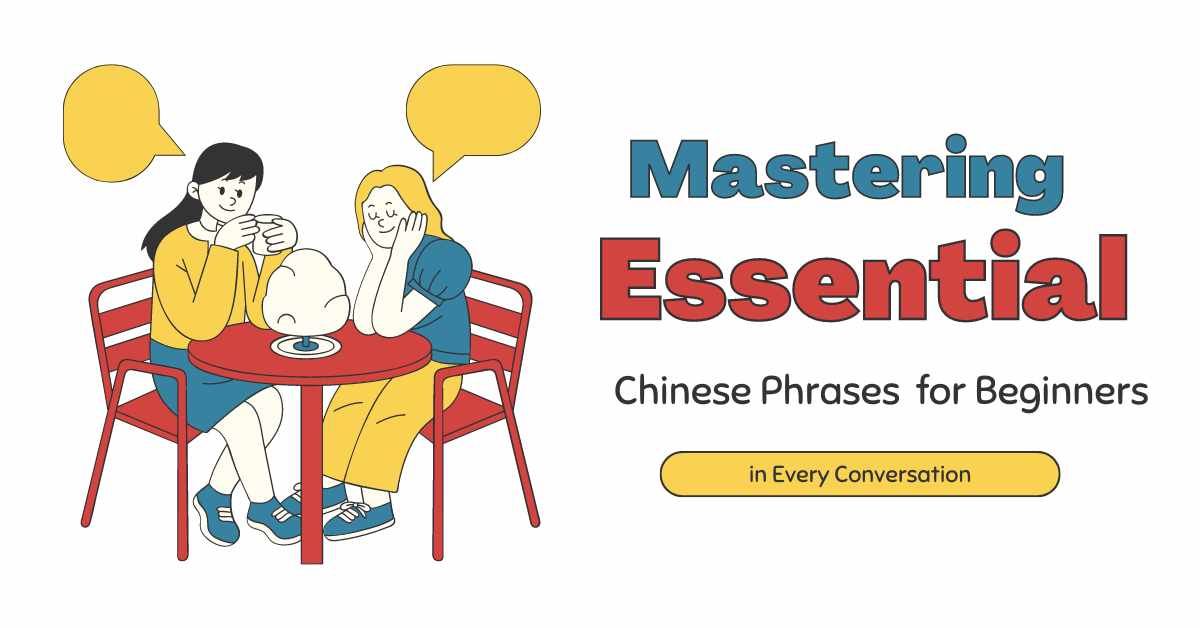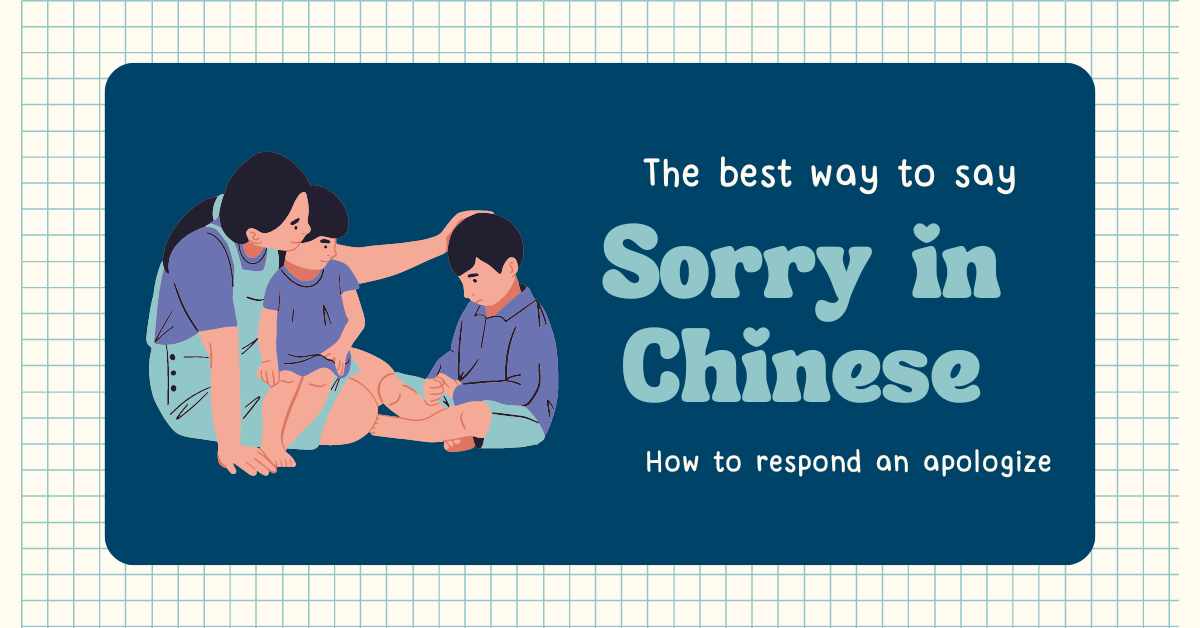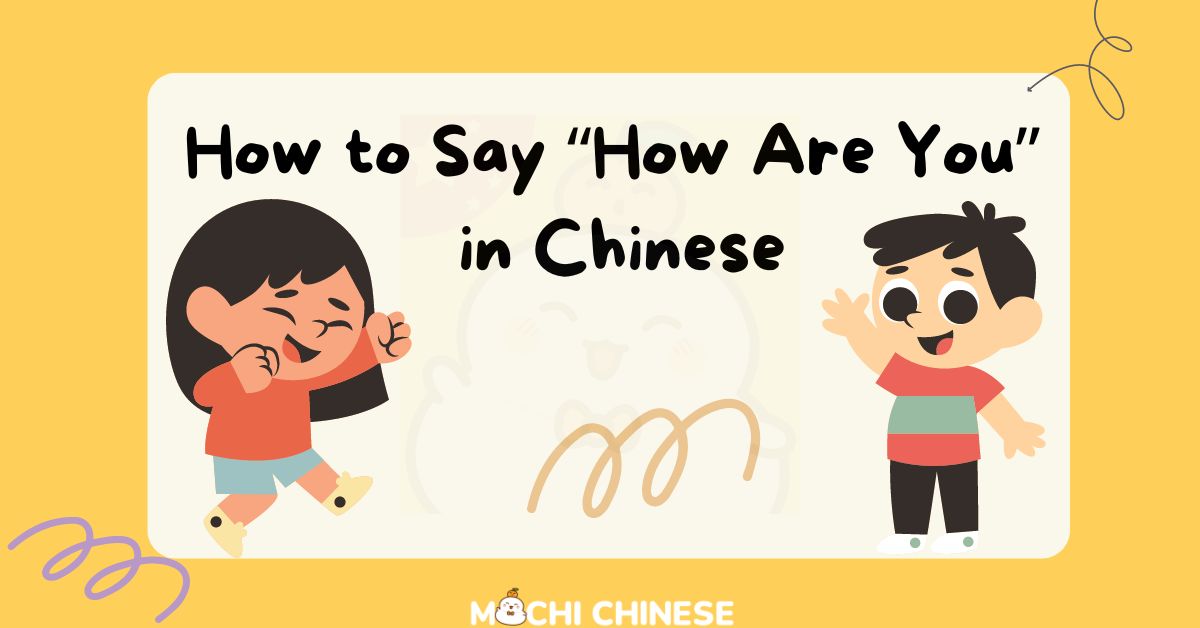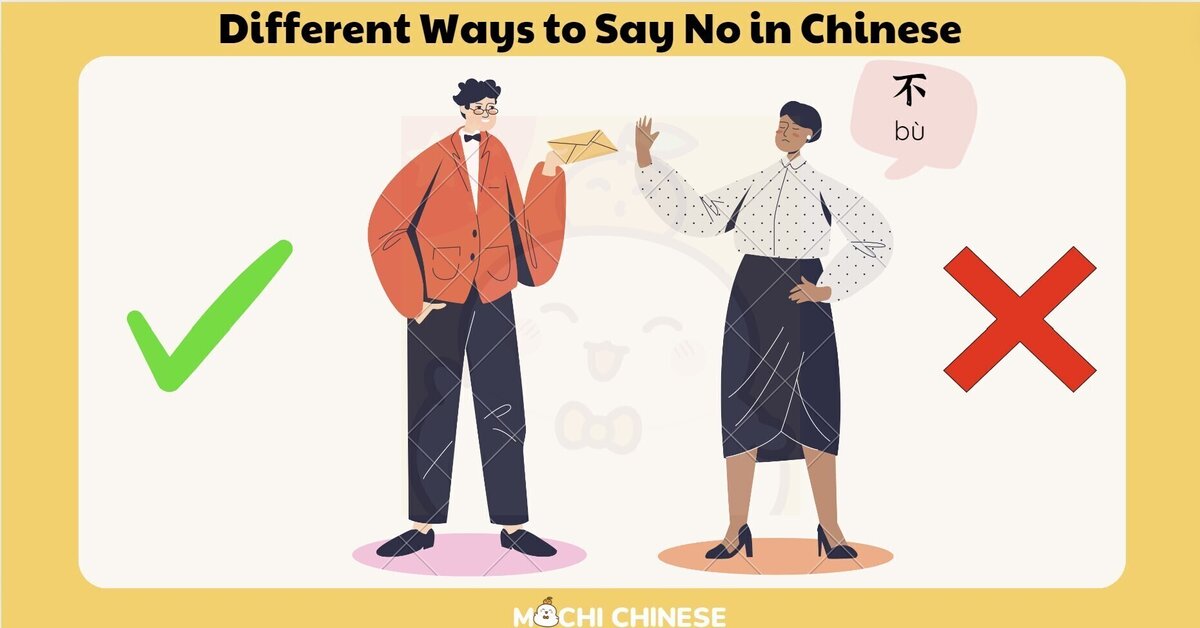In Chinese culture, saying goodbye holds significant importance. It’s not just about bidding farewell; it’s a reflection of respect, politeness, and cultural understanding. From casual encounters to formal settings, knowing the right words can leave a lasting impression. Let’s delve into the nuances of saying goodbye in Chinese across various situations.
Basic Goodbyes in Chinese
Casual Goodbye
When it comes to casual goodbyes, you’ll find that the phrases are simple and often used among friends, peers, or acquaintances in informal settings. One of the most common ways to say goodbye casually is:
- Zàijiàn (再见) – This is the equivalent of “goodbye” in English and can be used in almost any situation. It’s versatile and universally understood, making it a safe choice if you’re ever in doubt.
Another casual way to say goodbye, often used among younger people or in very informal settings, is:
- Bàibài (拜拜) – Borrowed from the English “bye-bye,” this is a light-hearted and friendly way to part ways. It’s commonly used in texting and casual conversations.
Formal Goodbye
In more formal settings, the way you say goodbye should reflect the respect and seriousness of the occasion. Here are a couple of phrases that work well in formal contexts:
- Zàijiàn (再见) – Yes, this phrase appears again, but with a different tone and context, it becomes appropriate for formal settings as well. The versatility of “zàijiàn” cannot be overstated.
- Bàozhòng (保重) – This means “take care” and is often used to express concern and care, making it suitable for more serious and respectful goodbyes.
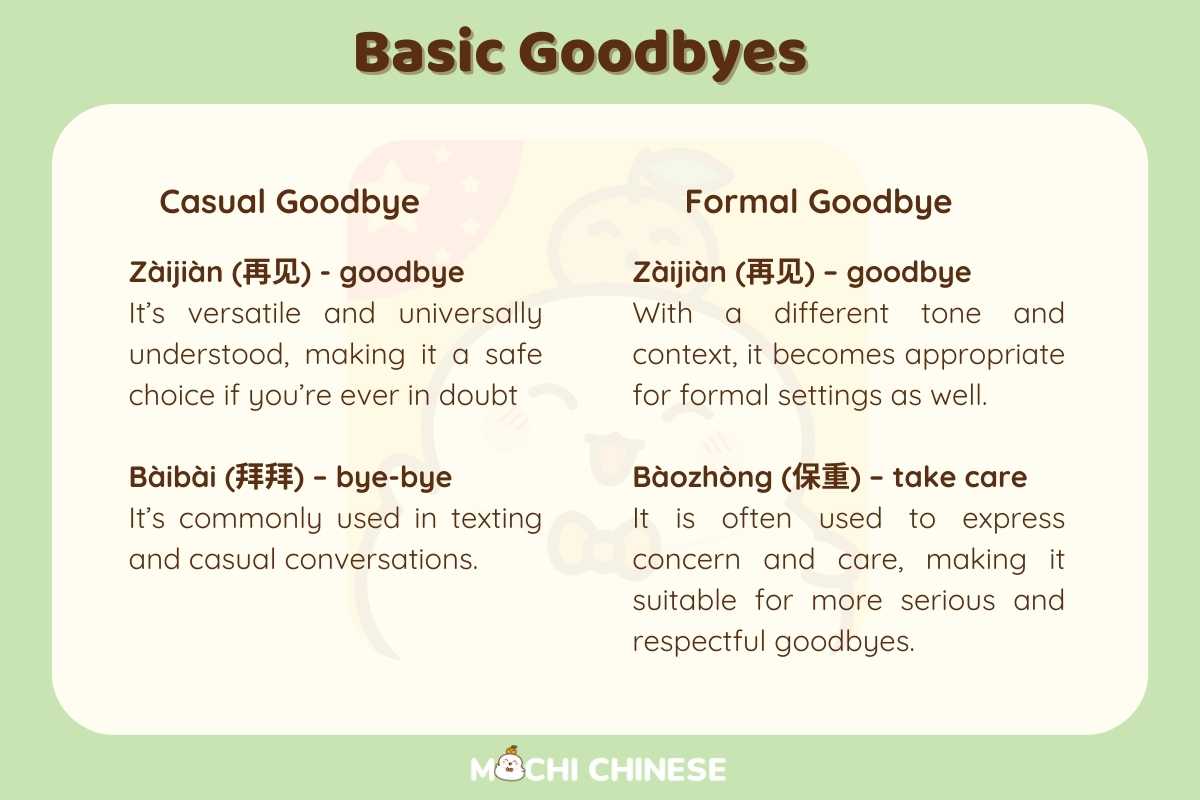
Goodbyes in Social Settings
With Friends
When you’re with friends, goodbyes are usually light-hearted and relaxed. Here are a few ways to say goodbye to friends:
- Huítóu jiàn (回头见) – This phrase translates to “see you later” and is a common way to say goodbye to friends you expect to see again soon.
- Mànzǒu (慢走) – Literally meaning “walk slowly,” it’s a way of saying “take care” or “go safely,” and is often used when you’re seeing someone off.
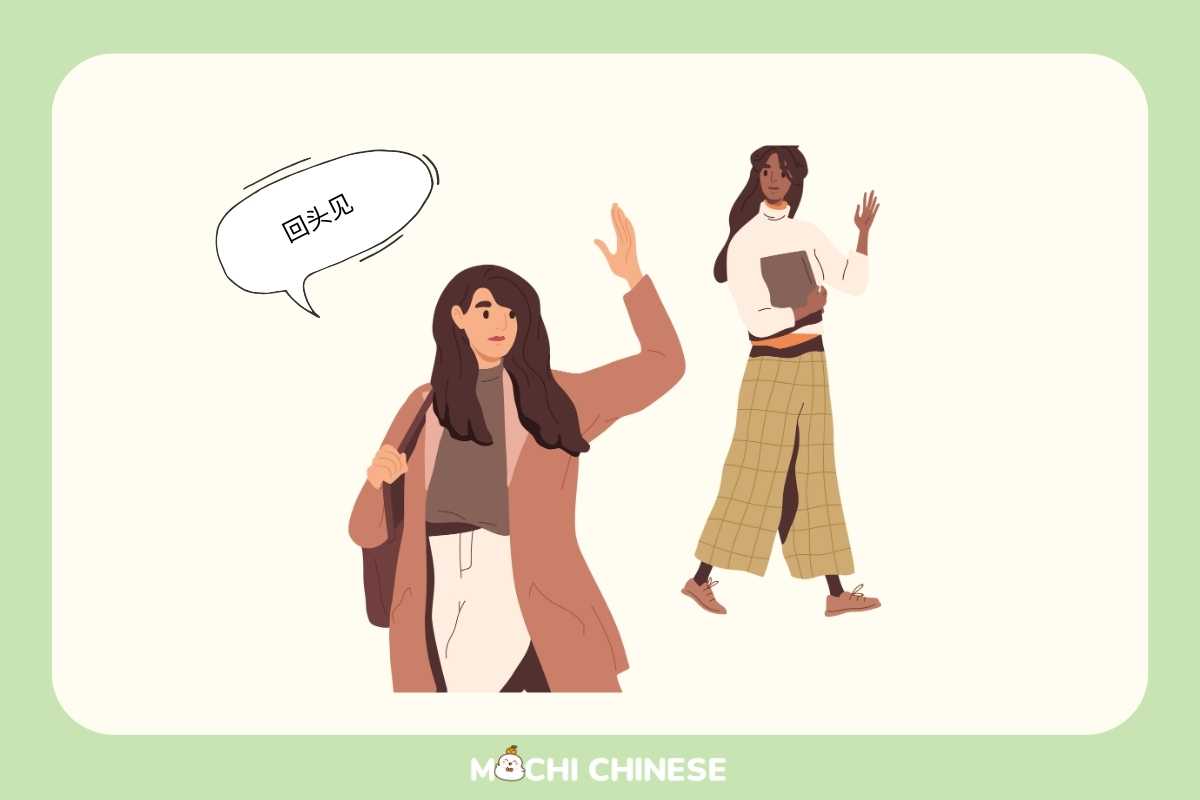
After a Casual Meeting
After a casual meeting, perhaps with new acquaintances or in a relaxed social gathering, these phrases can be appropriate:
- Zàijiàn (再见) – Again, this phrase is perfectly acceptable in casual meetings.
- Xiàcì jiàn (下次见) – Meaning “see you next time,” it implies a hope or expectation of meeting again in the future.
Leaving
When you’re the one leaving, especially in a context where you’re visiting someone’s home or space, you might use:
- Bù hǎo yìsi, wǒ yào zǒu le (不好意思,我要走了) – This polite phrase means “I’m sorry, but I have to go.” It’s a courteous way to indicate your departure.
- Wǒ xiān zǒu le (我先走了) – This means “I’ll leave first,” which is a polite way to excuse yourself from a gathering.
Goodbyes in Professional Settings
Ending a Business Meeting
In a professional setting, the way you conclude a meeting can leave a lasting impression. Here are some ways to end a business meeting on a good note:
- Xièxiè, wǒmen liánxì (谢谢,我们联系) – This means “thank you, let’s stay in touch.” It’s a courteous way to end a meeting, expressing gratitude and the intent to continue communication.
- Zàijiàn, xiàcì jiàn (再见,下次见) – This combines “goodbye” with “see you next time,” which is both formal and friendly.
Leaving the Office
When you’re leaving the office for the day or saying goodbye to colleagues, these phrases can be used:
- Xià wǔ hǎo, míngtiān jiàn (下午好,明天见) – This means “good afternoon, see you tomorrow,” which is a nice way to end the workday.
- Zàijiàn, yī lù píng’ān (再见,一路平安) – “Goodbye, safe travels,” is a thoughtful way to wish your colleagues well as they leave.
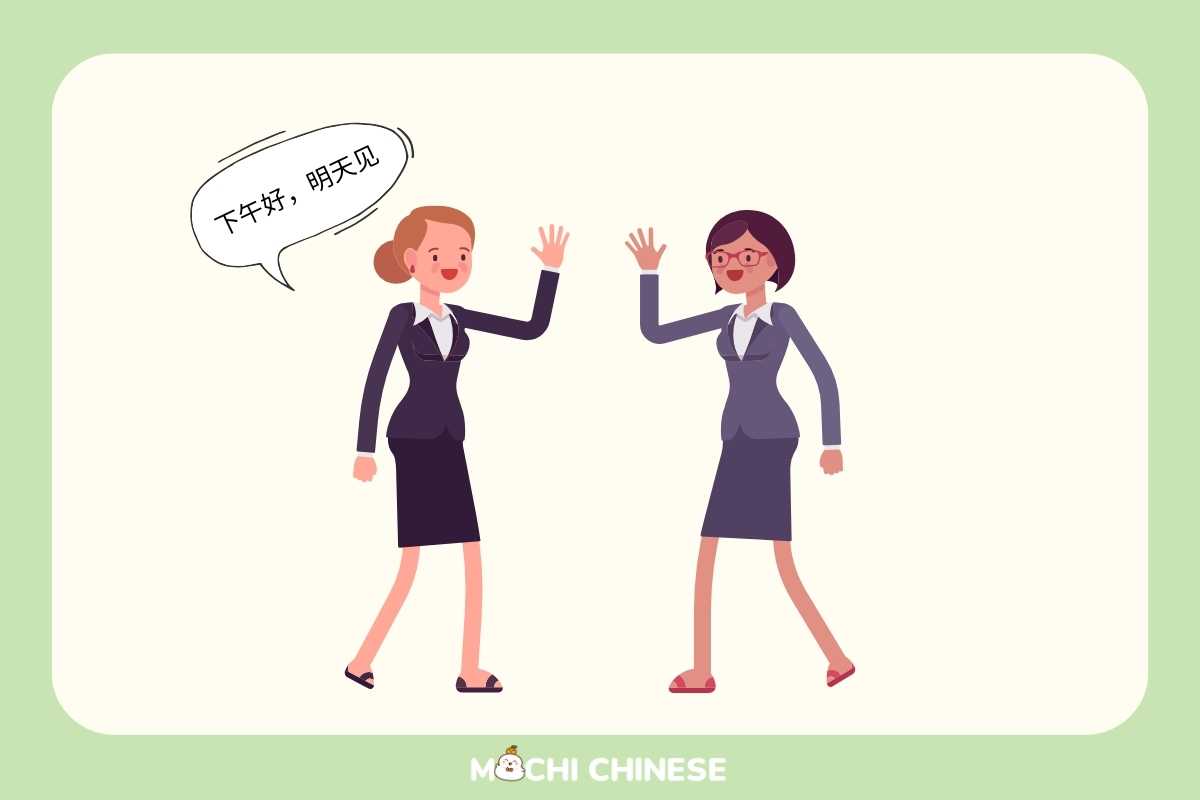
Goodbyes in Family and Formal Occasions
Family Farewells
When saying goodbye to family members, the phrases often carry more warmth and care. Here are a few:
- Bàba, māma, zàijiàn (爸爸,妈妈,再见) – This simple “goodbye, dad, mom” is straightforward yet affectionate.
- Nǐmen yào bǎozhòng (你们要保重) – “You all take care” shows a deep level of concern and care for family members.
At a Formal Event
Formal events, such as weddings or banquets, call for respectful and sometimes elaborate goodbyes. Here are a few appropriate phrases:
- Xièxiè dàjiā, wǒ xiān zǒu le (谢谢大家,我先走了) – This means “thank you, everyone, I’ll be leaving first,” which is polite and shows gratitude.
- Zhù dàjiā wǎn’ān (祝大家晚安) – “Wishing everyone a good night” is a respectful way to bid farewell at an evening event.
Say Goodbye in Chinese following a specific time
In Chinese culture, the time of day can influence the choice of goodbye phrase. Here are some common expressions used based on specific times:
Morning Farewells
- 早安 (zǎo ān): “Good morning.” Used when parting ways in the morning, especially among family members or colleagues at the start of the day.
Afternoon Farewells
- 下午好 (xiàwǔ hǎo): “Good afternoon.” Suitable for farewells in the afternoon, whether leaving a meeting or saying goodbye to friends during lunchtime.
Evening/Night Farewells
- 晚安 (wǎn ān): “Good evening” or “good night.” Used when saying goodbye in the evening or at night, whether leaving a social gathering or bidding farewell to family members before bedtime.
Seasonal Farewells
- 春节愉快 (chūnjié yúkuài): “Happy Spring Festival.” Commonly used during the Chinese New Year period when bidding farewell to friends and family members.
- 端午安康 (duānwǔ ānkāng): “Healthy and Happy Dragon Boat Festival.” Exchanged during the Dragon Boat Festival when saying goodbye to loved ones.
- 中秋快乐 (zhōngqiū kuàilè): “Happy Mid-Autumn Festival.” Shared when bidding farewell to friends and family during the Mid-Autumn Festival celebrations.
Special Occasion Farewells
- 生日快乐 (shēngrì kuàilè): “Happy Birthday.” Exchanged when bidding farewell to someone on their birthday, expressing good wishes for the year ahead.
- 新年快乐 (xīnnián kuàilè): “Happy New Year.” Used when saying goodbye during the New Year celebrations, wishing prosperity and happiness for the coming year.
Regional Variations of Goodbyes in Chinese
Introduction to Regional Differences
China is vast, with a rich tapestry of dialects and regional cultures. This diversity extends to the way people say goodbye. Here are some regional variations:
Using Chinese Chengyu for Goodbye
Chinese chengyu (成语) are traditional idiomatic expressions that can add a touch of eloquence to your farewells. Here are a few that can be used to say goodbye:
Hòuhuì yǒuqī (后会有期) – This chengyu means “we will meet again someday,” and is a poetic way to say goodbye.
Yìlù shùnfēng (一路顺风) – “Have a safe journey” is often used when someone is leaving for a trip.
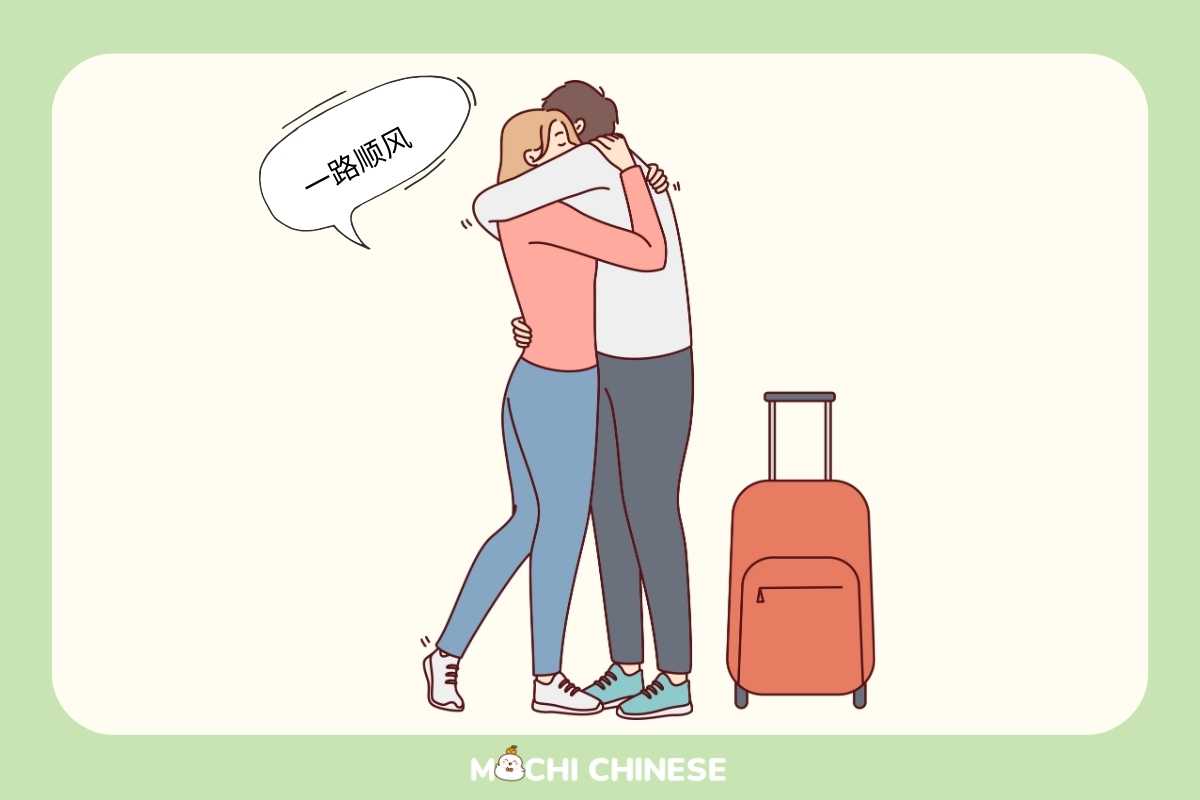
Common Regional Phrases
In Cantonese-speaking regions, you might hear:
Jóu táu (早抖) – A casual goodbye that means “goodbye.”
In Taiwan, you might use:
Bàibài (拜拜) – Similar to Mandarin, it’s casual and friendly.
Tips for Remembering and Using Chinese Goodbye Phrases
Practical Tips
- Regular Practice: Incorporate goodbye phrases into your daily conversations to reinforce memory and fluency. Practice with friends, family, or language exchange partners to make learning more interactive and enjoyable.
- Use Language Apps: Utilize language learning apps like Mochi Chinese to supplement your studies. These apps offer interactive lessons, quizzes, and flashcards tailored to your proficiency level, making memorization more effective and engaging.
Contextual Learning
- Understand Cultural Nuances: Familiarize yourself with the cultural context in which each goodbye phrase is used. Consider factors like the relationship between you and the other person, the formality of the situation, and regional customs.
- Watch Chinese Media: Immerse yourself in Chinese movies, TV shows, and music to observe how native speakers use goodbye phrases in various contexts. Pay attention to tone, gestures, and facial expressions to grasp the subtleties of communication.
Advice on Cultural Sensitivity
- Respect Hierarchy: In Chinese culture, hierarchy plays a significant role in communication. Use appropriate honorifics and formal language when bidding farewell to elders, superiors, or individuals of higher status to show respect and courtesy.
- Be Mindful of Timing: Consider the timing and frequency of goodbye expressions. Avoid using overly formal phrases in casual settings, as it may come across as insincere or rigid. Similarly, refrain from using overly casual language in formal or professional contexts.
Practice, Patience, and Perseverance
- Embrace Mistakes: Don’t be afraid to make mistakes when practicing Chinese goodbye phrases. Learning a new language is a journey filled with ups and downs, and making errors is a natural part of the process. Embrace these mistakes as opportunities for growth and improvement.
- Celebrate Progress: Celebrate your progress along the way. Whether it’s mastering a new phrase, understanding a cultural nuance, or confidently using goodbye expressions in real-life situations, each milestone is a testament to your dedication and perseverance.
Conclusion
Saying goodbye in Chinese isn’t just about the words; it’s about conveying respect, warmth, and well-wishes. By mastering a range of goodbye phrases, you can navigate various social, professional, and familial contexts with ease. Remember to practice regularly, embrace cultural nuances, and immerse yourself in the language to truly enhance your Mandarin skills. So, go ahead, bid farewell in Chinese, and watch as your language proficiency and cultural understanding flourish. Good luck, or as we say, “祝你好运” (zhù nǐ hǎo yùn)!
Recommendation: Mochi Chinese App – Memorize 1000 words in 30 days
Mochi Chinese offers a range of features designed to enhance your learning experience, including interactive lessons, quizzes, spaced repetition and Golden Time techniques.
- Focus on Joyful Learning: Mochi Chinese aims to make learning Chinese fun and engaging.
- Bright Design & Adorable Mascots: The app uses cheerful colors and cute characters to keep you motivated.
- Spaced Repetition System: Smart algorithms help you review words at the perfect time to boost memorization.
Download the Mochi Chinese app on Google Play Store, App Store, or Web version!
